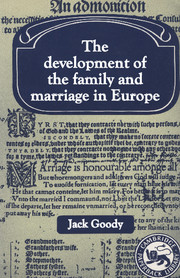Book contents
- Frontmatter
- Contents
- List of figures, maps and tables
- Preface
- 1 Perspectives
- 2 Two sides to the Mediterranean
- 3 Change in the German lands
- 4 Cousins and widows, adoptees and concubines
- 5 From sect to Church
- 6 Church, land and family in the West
- 7 Reformation and reform
- 8 The hidden economy of kinship
- 9 The spiritual and the natural
- Appendix 1 Kin groups: clans, lineages and lignages
- Appendix 2 From brideprice to dowry?
- Appendix 3 ‘Bilaterality’ and the development of English kin terminology
- References and bibliography
- Glossary
- Index
6 - Church, land and family in the West
Published online by Cambridge University Press: 05 June 2012
- Frontmatter
- Contents
- List of figures, maps and tables
- Preface
- 1 Perspectives
- 2 Two sides to the Mediterranean
- 3 Change in the German lands
- 4 Cousins and widows, adoptees and concubines
- 5 From sect to Church
- 6 Church, land and family in the West
- 7 Reformation and reform
- 8 The hidden economy of kinship
- 9 The spiritual and the natural
- Appendix 1 Kin groups: clans, lineages and lignages
- Appendix 2 From brideprice to dowry?
- Appendix 3 ‘Bilaterality’ and the development of English kin terminology
- References and bibliography
- Glossary
- Index
Summary
The Christian Church began as a loosely organised body within the Empire. With the conversion of Constantine, a radical change took place. As emperor, he removed the restrictions that had lain upon the Church and bestowed privileges and authority upon its priesthood, at the same time as becoming its moderator. ‘This created, once and for all’, declared Knowles, ‘the problem of Church and State’ (1970: 10). This problem arose partly because the Church became a property-holding corporation, capable of acquiring land by gift, by inheritance or by purchase. As Hughes points out for the early Irish Church, as it gained property and privileges and assumed responsibilities, it had necessarily to take an interest in material wealth (1966: 167). This interest involved an adjustment to and in both secular and ecclesiastical law.
THE ACCUMULATION OF WEALTH
Once permitted, the build-up of wealth was very rapid. In the East the Church's property grew enormously between the fourth and sixth centuries. In the West, during the early Merovingian period in Gaul, the process continued so swiftly that at the end of the sixth century Chilperic complained that all the wealth of the kingdom had been transferred to the churches. Some of the methods of accumulation were ingenious. In Spain even the property of a freed ecclesiastical slave who had married a person of free birth belonged to the Church, until the Visigothic king Wamba did away with this ‘profitable convenience’.
- Type
- Chapter
- Information
- The Development of the Family and Marriage in Europe , pp. 103 - 156Publisher: Cambridge University PressPrint publication year: 1983



